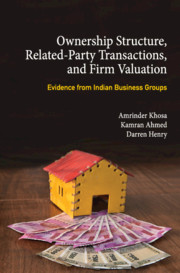 Ownership Structure, Related Party Transactions, and Firm Valuation
Ownership Structure, Related Party Transactions, and Firm Valuation Book contents
- Frontmatter
- Contents
- List of Tables
- 1 Introduction
- 2 The Evolution of Business Groups, Institutional Framework in India, and Related-Party Transactions
- 3 Theory and Literature Review
- 4 Hypotheses Development
- 5 Research Methods
- 6 Descriptive Statistics
- 7 Empirical Results
- 8 Additional Tests
- 9 Implications of the Study and Conclusion
- Appendix 1 List of Sample Firms
- Appendix 2 List of Business Groups
- References
- Index
4 - Hypotheses Development
Published online by Cambridge University Press: 26 April 2019
- Frontmatter
- Contents
- List of Tables
- 1 Introduction
- 2 The Evolution of Business Groups, Institutional Framework in India, and Related-Party Transactions
- 3 Theory and Literature Review
- 4 Hypotheses Development
- 5 Research Methods
- 6 Descriptive Statistics
- 7 Empirical Results
- 8 Additional Tests
- 9 Implications of the Study and Conclusion
- Appendix 1 List of Sample Firms
- Appendix 2 List of Business Groups
- References
- Index
Summary
Introduction
This chapter develops hypotheses based on the theoretical and institutional settings presented in previous chapters. Chapter 2 outlined the institutional background in India, which is characterized by concentrated ownership, or family dominance and weak investor protection. Cross-holdings and indirect control rights of founding families provide controlling shareholders the incentive to extract private benefits. In a weak investor protection environment, it becomes easier for controlling shareholders to extract firm resources for their own personal benefits.
Chapter 3 reviewed literature on the behaviour of business groups, family firms and RPTs, and highlighted several motivations for controlling shareholders to indulge in value destroying activities. Consequently, the disclosure of RPTs might be valued negatively. Ownership rights of different groups are expected to affect firm value differently. RPTs between subsidiary and holding firms are likely to be valued on the basis of the nature of the transaction, whereas indirect rights of controlling shareholders are likely to play a key role in the valuation of RPTs with member firms. The presence of indirect ownership presents benefits for controlling shareholders to extract private benefits, and it is likely to influence the valuation of RPTs with member firms in the group.
This chapter is structured in two parts. The first section predicts the effects of ownership rights on firm value to seek evidence of expropriation of minority shareholders. In particular, we hypothesize the effect of direct and indirect rights of controlling shareholders on firm value. This is followed by hypotheses on the valuation effect of minority shareholdings. The second section predicts the value transfer potential of RPTs. The association between RPT disclosure and firm value is predicted to be influenced by the relationship with the party involved in the RPT, the nature of the transaction, and the indirect rights of controlling shareholders.
Firm value and ownership structure
The effect of ownership structure on firm value has been examined extensively in the literature. In particular, several studies have examined the role of large investors in resolving the conflict between shareholders and managers. Shleifer and Vishny (1997) argue that concentrated ownership provides both incentives and power to the controlling shareholders to mitigate agency problems. Therefore, the investors with large ownership stakes are viewed as value-adding. However, the other body of literature investigates the cost associated with the concentrated ownership.
Information
- Type
- Chapter
- Information
- Ownership Structure, Related Party Transactions, and Firm ValuationEvidence from Indian Business Groups, pp. 61 - 79Publisher: Cambridge University PressPrint publication year: 2019